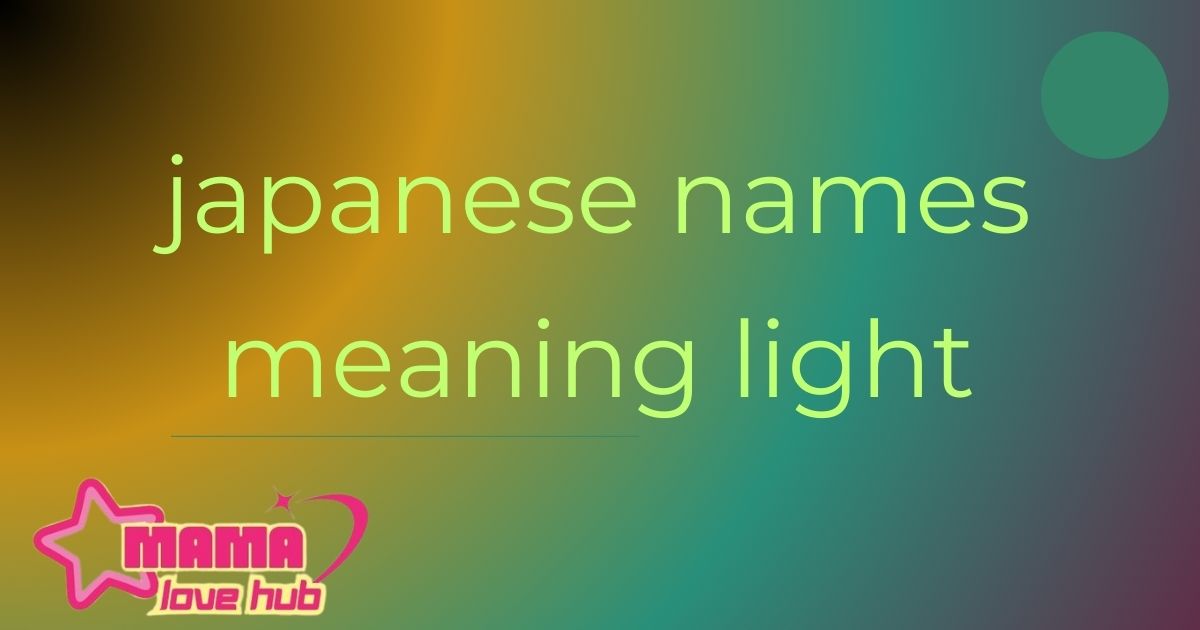Japanese Names Meaning Light: Illuminating the Essence of Identity
Introduction
Japanese names carry profound meanings deeply rooted in the rich tapestry of Japanese culture. Among these names, those symbolizing light hold a special significance, reflecting positivity, hope, and enlightenment. In this article, we delve into the enchanting world of Japanese names meaning light, exploring their meanings, cultural contexts, and significance.

Understanding Japanese Names
Japanese names are constructed with characters called “kanji,” each carrying its own unique meaning and pronunciation. These names often reflect familial heritage, aspirations, or even the time of birth.
Importance of Names in Japanese Culture
Names in Japanese culture are considered more than mere identifiers; they are reflections of one’s character, aspirations, and familial bonds. Choosing a name is a meticulous process, guided by tradition and symbolism.
Meaning of Light in Japanese Culture
Light holds a profound significance in Japanese culture, symbolizing purity, clarity, and enlightenment. It is associated with positivity, hope, and guidance, making it a popular motif in various aspects of Japanese life, including names.
Japanese Names Meaning Light: A Beautiful Symbolism
Japanese names that mean light carry a symbolism that transcends language barriers. They embody qualities such as brightness, warmth, and guidance, infusing positivity into the lives of those who bear them.

50 Japanese-inspired names for boys meaning light:
Akira: Bright and clear; a popular unisex name in Japan.
Daijiro: Combining “dai” meaning large and “jiro” meaning second son, Daijiro conveys a sense of radiant strength.
Haruto: Derived from “haru” meaning spring and “to” meaning person, Haruto symbolizes the brightness and vitality of springtime.
Hikaru: Radiance; shining brightly like the sun.
Kaito: Translates to “ocean light” or “ocean sky,” evoking the serene and luminous qualities of the sea.
Koichi: “Light of happiness”; a name that brings joy and brightness.
Mitsuru: Meaning “full of light,” Mitsuru embodies brightness and clarity.
Noboru: To ascend or rise; representing the dawning of a new day filled with light.
Raiden: A name associated with thunder and lightning, symbolizing power and energy.
Teruaki: “Shining brightness”; a name that radiates light and positivity.
Yoshito: Derived from “yoshi” meaning good or auspicious, and “to” meaning person, Yoshito signifies a person filled with light and goodness.
Takumi: “Skilled” or “artisan”; conveys the idea of someone who shines brightly through their craftsmanship.
Kazuki: Combining “kazu” meaning harmony or peace, and “ki” meaning radiance, Kazuki represents the brightness of harmonious energy.
Daiki: Great radiance; a name that shines brightly with strength and vitality.
Satoshi: Clear-thinking; embodies the clarity and brightness of a sharp mind.
Yukio: “Radiant man”; evokes the image of someone illuminated with inner light.
Akimitsu: Combining “aki” meaning light or brightness, and “mitsu” meaning shine or illuminate, Akimitsu signifies radiant illumination.
Sora: Meaning “sky” or “heaven”; represents the vast expanse of luminous space.
Takashi: “Noble brightness”; a name that exudes dignity and radiance.
Yoshiaki: Combining “yoshi” meaning good or auspicious, and “aki” meaning brightness, Yoshiaki symbolizes the goodness and brightness of life.
Yukito: Derived from “yuki” meaning happiness or snow, and “to” meaning person, Yukito conveys the joy and purity of radiant light.
Akihiko: Bright prince; a name that shines with regal elegance.
Hinata: Sunshine; embodies the warmth and brightness of the sun.
Toshiro: “Talented” or “intelligent”; represents the brilliance and sharpness of mind.
Nobuhiro: Combining “nobu” meaning faith or trust, and “hiro” meaning wide or broad, Nobuhiro signifies the expansive brightness of trust.
Ryota: Refreshing light; symbolizes new beginnings and vitality.
Taiki: Great radiance; conveys the brightness and power of light.
Yuto: Meaning “gentle as sunlight”; evokes the gentle and soothing qualities of light.
Akio: Bright man; embodies the radiance and strength of light.
Genki: Vigorous energy; symbolizes the vibrant brightness of life.
Kenshin: Clear heart; represents the purity and clarity of inner light.
Ryuu: “Dragon”; signifies the majestic and luminous qualities of mythical creatures.
Tsubasa: Wings; evokes the image of soaring through the sky bathed in sunlight.
Yasushi: Combining “yasu” meaning peace or calm, and “shi” meaning will or purpose, Yasushi embodies the peaceful brightness of inner resolve.
Akihiro: Bright autumn; symbolizes the golden glow of autumn light.
Hayate: Gale or strong wind; represents the powerful and dynamic nature of light.
Kiyoshi: “Pure” or “clear”; conveys the untainted brightness of innocence.
Masaaki: True brightness; signifies the authentic and genuine radiance of light.
Ren: Lotus; embodies the purity and beauty of a flower bathed in sunlight.
Takao: “Noble and manly”; a name that shines with dignity and strength.
Yoshiki: Combining “yoshi” meaning good or auspicious, and “ki” meaning radiance, Yoshiki signifies the brightness of good fortune.
Akiyoshi: Bright and good; represents the radiant qualities of goodness and positivity.
Hiroshi: Generous; embodies the expansive and luminous nature of generosity.
Kazuhiko: Combining “kazu” meaning harmony or peace, and “hiko” meaning boy, Kazuhiko signifies a boy filled with harmonious brightness.
Masaki: True brightness; symbolizes the authentic and genuine radiance of light.
Reo: “Radiant man”; evokes the image of someone illuminated with inner light.
Takumi: “Skillful” or “artisan”; conveys the idea of someone who shines brightly through their craftsmanship.
Yoshito: Derived from “yoshi” meaning good or auspicious, and “to” meaning person, Yoshito signifies a person filled with light and goodness.
Yukio: “Radiant man”; evokes the image of someone illuminated with inner light.
Akimitsu: Combining “aki” meaning light or brightness, and “mitsu” meaning shine or illuminate, Akimitsu signifies radiant illumination.
These names not only carry beautiful meanings related to light but also reflect the cultural richness and symbolism of Japan.
Exploring the Significance of Each Name
Each name carries its own unique nuances and connotations, reflecting different aspects of light and its symbolism in Japanese culture. Hikari, for example, signifies radiance and clarity, while Akira represents brightness and intelligence.
Naming Traditions in Japan
Naming traditions in Japan are deeply rooted in cultural beliefs and practices. Parents often seek guidance from astrologers or consider auspicious elements when naming their children, ensuring a harmonious balance of meanings and sounds.
Tips for Choosing a Japanese Name
Choosing a Japanese name requires careful consideration of its meaning, pronunciation, and cultural significance. It’s essential to research thoroughly and consult native speakers or experts to ensure authenticity and appropriateness.
How Japanese Names Reflect Personality
Japanese names not only reflect the qualities associated with light but also offer insights into the personality traits of individuals. Names like Aiko, meaning “love child,” may indicate a nurturing and affectionate nature, while Kiyomi, meaning “pure beauty,” reflects elegance and grace.
Cultural Influence on Naming Practices
The naming practices in Japan are influenced by various cultural factors, including religion, literature, and historical events. Names may draw inspiration from mythology, nature, or even contemporary trends, reflecting the dynamic nature of Japanese society.
Modern Trends in Japanese Naming
In modern Japan, there is a growing trend towards unique and unconventional names, departing from traditional norms. While some parents still adhere to time-honored naming conventions, others seek to express individuality and creativity through their children’s names.
Impact of Japanese Names on Global Culture
Japanese names, with their elegant simplicity and profound meanings, have captivated people around the world. They have become increasingly popular choices for non-Japanese individuals seeking names that resonate with depth and beauty.
Conclusion
Japanese names meaning light encapsulate the timeless charm and cultural richness of Japan. They serve as poignant reminders of the enduring power of positivity, hope, and enlightenment, illuminating the path towards a brighter future.
FAQs on Japanese Names Meaning Light
Are Japanese names gender-specific?
While some Japanese names are gender-specific, many are unisex and can be used for both boys and girls.
How do you pronounce Japanese names correctly?
Pronunciation in Japanese is crucial and often follows strict rules. Consulting native speakers or language resources can help ensure accurate pronunciation.
Can Japanese names have multiple meanings?
Yes, many Japanese names can have multiple meanings depending on the characters used and their combinations.
What is the significance of naming ceremonies in Japan?
Naming ceremonies are important cultural events in Japan, where families gather to celebrate the birth of a child and bestow upon them a name that carries blessings and wishes for their future.
Are there any taboos or superstitions associated with naming in Japan?
Yes, certain combinations of characters may be

